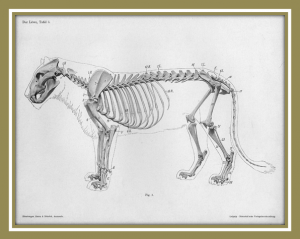News
Latest Lion Aid News
Are lions being poached for their bones?
Thursday 9th May 2013

Yours for $10,000 Given that South Africa is supplying considerable volumes of lion bones to mainly Laos but also Vietnam and China (see table below) and that LionAid has warned that such trade could well stimulate a demand that would increasingly involve poaching of lions, an article in the recent edition of Botswana’s Ngami Times newspaper is worrisome. The South African trade involves lion breeders/canned lion hunters and taxidermists at least, and it is reported that lion bones are selling for about $165 per kilo in South Africa and about $300-$500 at destination. The value of a lion skeleton could therefore be in excess of $10,000. In China, lion bones are soaked for a variable period in rice wine, whereas in Laos and Vietnam the bones are made into a “paste” with added ingredients like herbs (some reports say opium is also mixed in). The paste is then also dissolved in rice wine. Such bone tonics are used to treat a variety of ailments. Lion bones are being used as substitutes for tiger bone potions, and bones from wild lions are considered more efficacious than those bred in captivity – the same applies to tiger bones from wild tigers versus those sold for traditional Chinese medicines from the extensive “tiger farms” in China. The article (http://www.ngamitimes.com/) states the following: “The Ministry of Environment, Wildlife and Tourism has strongly warned farmers against staging livestock predation incidents, adding that the full strength of law will be applied to such offenders. The director of the Department of Wildlife and National Parks, Oduetse Koboto said some farmers colluded with foreign nationals to stage incidents of livestock predation in order to claim compensation from government. He states that “such perpetrators illegally killed and harvested certain parts from wild animals for illicit trade. They later surrender skins and other animal remains to the Department of Wildlife and National Parks to legitimise their claims for losses against predators.”Koboto explained to the Ngami Times that this is a suspected new development which the department intends to nip in the bud. Though he could not point to a specific incident at this stage, the wildlife director maintained that some of the reported cases of livestock predation have been highly suspicious, and that Ngamiland is one of those regions where such cases have raised eye-brows. He further disclosed that such incidents involve primarily lions and leopards.” In South Africa, Vietnamese and Thai nationals have been arrested at O.R. Tambo International Airport with illegal lion bones in their luggage, but levels of the illegal trade are considered much higher than such occasional seizures suggest. With authorities concentrating on illegal ivory and rhino horn shipments, bones could well be smuggled out undetected. The extent to which poaching of lions occurs is difficult to estimate. Since poached lion carcasses are much smaller than those of elephants and rhinos, their detection is more difficult. Even when found, lion remains are likely to be seen as natural mortality and subsequent carcass destruction by scavengers. In India, all carcasses of tigers are considered poaching incidents until other reasons for mortality can be supported. Perhaps lion carcasses should now be treated with the same degree of suspicion. Picture credit: http://nl.wikipedia.org/wiki/Bestand:Lion_anatomy_lateral_skeleton_view.jpg Table 1: Lion bone exports from South Africa listed on CITES records
If you have not already signed up to our mailing list, you can add your name here and keep up to date with our ongoing work and, most importantly, DONATE to support our work to conserve the remaining fragile lion and wildlife populations. Thank you. LionAid is proud to be taking part in the very first Big Give Charities Raffle and we hope you will be keen to support us - and be in with a chance of winning fantastic prizes! For full details on the raffle, please click here To buy your tickets on behalf of LionAid now, please click here Categories: Extinction, Domesticating Animals |
Posted by Pieter Kat at 11:21
No comments have been posted yet.
Add a new comment
Existing user
New user sign up



